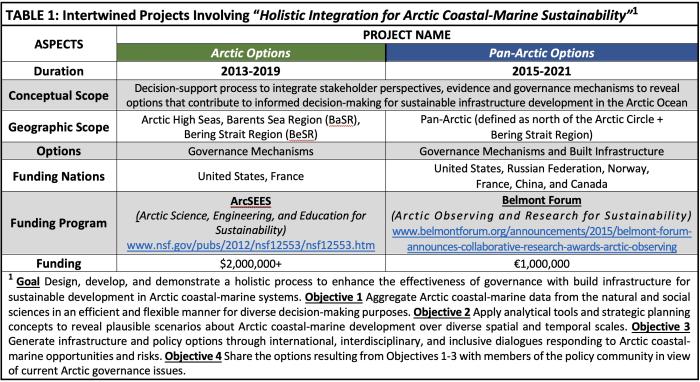Submitted by: Paul Arthur Berkman, coordinator of the Pan-Arctic Options and Arctic Options projects, on behalf of the Pan-Arctic Options Team representing holistic collaboration with Canada, China, France, Norway, Russia, and the United States
PAN-ARCTIC OPTIONS: Holistic Integration for Arctic Coastal-Marine Sustainability is a Belmont Forum project involving national science agencies in Canada, China, France, Norway, Russia, and the United States from 2015–2021. This holistic (international, interdisciplinary and inclusive) project evolved directly from Arctic Options: Holistic Integration for Arctic Coastal-Marine Sustainability supported by France and the United States from 2013—2019. The interlinked goal, objectives, and logistics of these two projects are reflected in Table 1.
A major activity of the Arctic Options and Pan-Arctic Options projects (operating with synergies through the Science Diplomacy Center they have been supporting since 2017) involves production of the book series, Informed Decisionmaking for Sustainability, that is being published by Springer with Arctic Options/Pan-Arctic Options team members as series co-editors. With informed decisions operating across a "continuum of urgencies"—as characterized with science and technology advisors to Foreign Ministers (See PDF here)—this book series evolved from the 2017 paper in Science, The Arctic Science Agreement Propels Science Diplomacy. The theory, methods, and skills of informed decisionmaking as the engine of science diplomacy (See: Science Diplomacy and Its Engine of Informed Decisionmaking: Operating through Our Global Pandemic with Humanity) now are being applied, trained, and refined with the: (1) joint video-conferencing semester course between institutions in the United States and Russian Federation; (2) University of the Arctic (UArctic) Science Diplomacy Thematic Network; (3) diplomatic academies through Ministries of Foreign Affairs; and (4) United Nations Institute for Training and Research (UNITAR).
Volume 1. Governing Arctic Seas: Regional Lessons from the Bering Strait and Barents Sea was published in January 2020 and launched at Arctic Frontiers 2020 in Tromsø, Norway. As noted on the website for this book:
"Governing Arctic Seas introduces the concept of ecopolitical regions, using in-depth analyses of the Bering Strait and Barents Sea Regions to demonstrate how integrating the natural sciences, social sciences and Indigenous knowledge can reveal patterns, trends and processes as the basis for informed decisionmaking. This book draws on international, interdisciplinary and inclusive (holistic) perspectives to analyze governance mechanisms, built infrastructure and their coupling to achieve sustainability in biophysical regions subject to shared authority. Governing Arctic Seas is the first volume in a series of books on Informed Decisionmaking for Sustainability that apply, train and refine science diplomacy to address transboundary issues at scales ranging from local to global. For nations and peoples as well as those dealing with global concerns, this holistic process operates across a 'continuum of urgencies' from security time scales (mitigating risks of political, economic and cultural instabilities that are immediate) to sustainability time scales (balancing economic prosperity, environmental protection and societal well-being across generations). Informed decisionmaking is the apex goal, starting with questions that generate data as stages of research, integrating decisionmaking institutions to employ evidence to reveal options (without advocacy) that contribute to informed decisions. The first volumes in the series focus on the Arctic, revealing legal, economic, environmental and societal lessons with accelerating knowledge co-production to achieve progress with sustainability in this globally-relevant region that is undergoing an environmental state change in the sea and on land.
In support of the Springer contracts with the book series editors and the Arctic Options / Pan-Arctic Options project, a Memorandum of Understanding was established with the Science Diplomacy Center and Arctic Frontiers to produce Volumes 2 and 3 of Informed Decisionmaking for Sustainability. With the abstract submission portal for Arctic Frontiers 2020, sixty abstracts were submitted for inclusion in Volume 2. Building Common Interests in the Arctic Ocean with Global Inclusion, which is being co-edited by Arctic Options/Pan-Arctic Options team members along with a former United States Ambassador and the former Director of Arctic Frontiers for publication in 2021 and launch at Arctic Frontiers 2022, when Volume 3. Pan-Arctic Implementation of Coupled Governance and Infrastructure will commence. This new book series builds on the Baseline of Russian Arctic Laws that was published by Springer in 2019, representing the "first comprehensive and authoritative translation into English of national and international laws of Russia that relate to the Arctic from the early 19th century to the present, revealing the historical and current context of sovereignty, sovereign rights and jurisdiction across nearly half of the north polar region."
With holistic integration, the books above represent the co-production of knowledge with natural sciences and social sciences as well as Indigenous knowledge, all of which reveal patterns, trends, and processes (albeit with different methods) that become the bases for decisions. Triangulation between research, education, and leadership is evolving from the Arctic Options/Pan-Arctic Options projects, considering local-global scalability with informed decisionmaking to operate from security to sustainability time scales for the benefit of all on Earth across generations.
About the Author
 Professor Paul Arthur Berkman, Associated Fellow, United Nations Institute for Training and Research (UNITAR) and Faculty Associate, Program on Negotiation (PON) at the Harvard Law School (Associate Director of Science Diplomacy, Harvard-MIT Public Disputes Program) is the coordinator of the Pan-Arctic Options and Arctic Options projects.
Professor Paul Arthur Berkman, Associated Fellow, United Nations Institute for Training and Research (UNITAR) and Faculty Associate, Program on Negotiation (PON) at the Harvard Law School (Associate Director of Science Diplomacy, Harvard-MIT Public Disputes Program) is the coordinator of the Pan-Arctic Options and Arctic Options projects.

